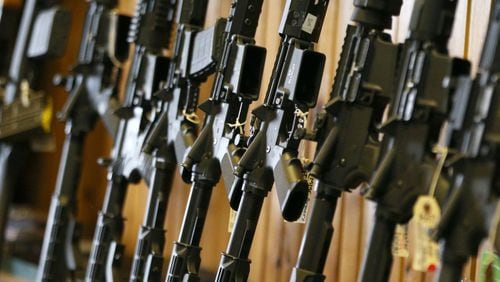Should teachers carry guns?
Will having a gun make you safer?
What gun sale rules save lives?
Following the school shooting last week in Parkland, Fla., that killed 17, calls for action have filled the news. But safety advocates say they lack perhaps the most important tool of all: objective research to know what actions would actually work.
Following testimony Thursday by new U.S. Secretary of Health and Human Services Alex Azar, questions are flying about whether such research will resume in force at the Atlanta-based U.S. Centers for Disease Control and Prevention, where it was abruptly shut down two decades ago.
“We’re asking legislators to vote on solutions without knowing what works,” said Mark Rosenberg, who headed that effort at the CDC. “We’ve put them in a terrible spot.”
In 1996, following heavy lobbying by the National Rifle Association, Congress directed the CDC not to “advocate or promote gun control.” CDC officials said they didn’t do that anyway. But they saw the directive, and a vote that effectively defunded their $2.6 million gun research program, as “a shot across the bow” that they must stop what they did do — research. So they stopped.
Following the Newtown, Conn., massacre of first-graders, President Barack Obama ordered the CDC to do research. But it was not funded well enough to answer major questions, and the fear was still there that Congress could retaliate, advocates said.
Nowhere does the question spark a stronger reaction than in Georgia — the home to the CDC, to the U.S. headquarters of the Glock firearms company and to an impassioned gun rights voter base, as well as the state that exports more guns used in crimes than any other state, according to the U.S. Bureau of Alcohol, Tobacco, Firearms and Explosives.
“Guns are not a problem in America. People are a problem — we have a societal problem and a lack of upbringing problem,” said Roger Sheppard, a member of the Currahee Friends of the NRA in Toccoa. “You want my answer, the answer is no — the CDC needs to stay out of it.”
Advocates of the old research program say the NRA had it shut down because it was afraid of the answers. NRA officials responded that the science coming out of the effort wasn’t science at all, and that it was led by biased workers.
“The problem that I see with what the CDC is doing is that they are not doing medicine, they’re doing politics,” NRA official Wayne LaPierre told The Atlanta Journal-Constitution at the time. “Their solution is a political opinion.”
Chief among the NRA's targets was Rosenberg, then the head of the CDC's National Center for Injury Prevention and Control. He had maintained that just like Congress created a national highway safety program whose research led to road safety features and seat belts that saved hundreds of thousands of lives in cars, research could do the same for guns.
Under him, the CDC funded a study on guns in households. It found that contrary to popular belief, gun ownership in a household did not appear to confer protection; furthermore, it was associated strongly with an independent risk of homicide.
The study noted it had limitations; gun advocates pilloried the paper and the science behind it. Rosenberg, now president emeritus of the Task Force for Global Health and still in Atlanta, claims the paper’s implications were the end of the gun research program in 1996, and eventually, the reason he was fired from the agency. “The NRA said, ‘This is not going to be good for selling guns, we’ve got to stop it,’” he said.
The NRA did not respond to a request for comment Monday.
Azar told a congressional subcommittee on Thursday that the CDC would certainly work on gun violence research.
“We believe we’ve got a very important mission with our work with serious mental illness as well as our ability to do research on the causes of violence and the causes behind tragedies like this,” he said. “So that is a priority for us at the Centers for Disease Control. … My understanding is that the (congressional directive) does not in any way impede our ability to conduct our research mission. It is simply about advocacy.”
One important House member said he agreed with Azar on doing the research but seemed to offer a caveat.
“If it relates to mental health, that certainly should be done,” Virginia Republican U.S. Rep. Bob Goodlatte, the chairman of the House Judiciary Committee, said on C-SPAN.
Dr. Frederick Rivara, who co-authored the incendiary paper on guns two decades ago, is concerned about that, and about the funding.
“They all want to blame it on mental health,” said Rivara, a pediatrician and professor in the School of Public Health at the University of Washington. “But we all know the minority of homicides committed are by people who are mentally ill.”
Asked whether the CDC should research guns as well as mental health, and whether it should be funded, a spokeswoman for Georgia Republican U.S. Sen. David Perdue said in an email that “any issue that could lead a person to commit an act of mass violence should be researched thoroughly and Secretary Azar has said this is something he intends to do.” U.S. Sen. Johnny Isakson, R-Ga., did not comment.
Rivara doesn’t know whether Congress can take much action at all, since “they couldn’t agree on getting rid of bump stocks right after Las Vegas,” the shooting where a “bump stock” attachment helped the gunman shoot much faster as he killed 58 concertgoers last year.
But if Congress can act together, just expressing support isn’t enough, Rivara said.
“Provide the money. Provide the money,” he said. “They can say all they want, but what do they do?”
About the Author








